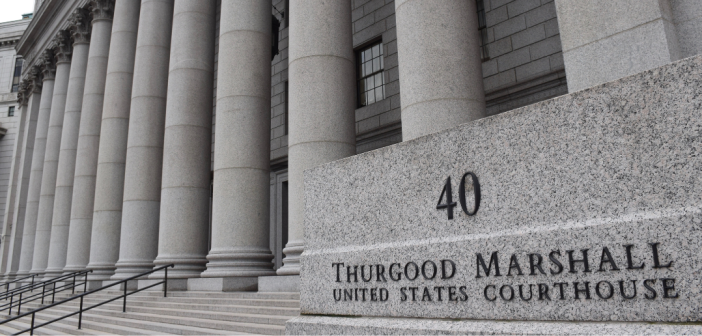When Alexander Rosa, who had been incarcerated at the Bridgeport Correctional Center in Connecticut since 2019, wanted to file a complaint in the U.S. District Court of Connecticut alleging he had received inadequate medical care in prison, he asked to pay $400 filing fee in installments pursuant to the Prison Litigation Reform Act. But the district court denied his motion, arguing that money that he had sent to his young son’s family for rent from his prison commissary account should have been used to pay for the fee in full at the time of filing.
Fordham Law students in the Federal Litigation Clinic took up Rosa’s case, arguing he could not pay for the court filing fee at the time of filing and still pay for his and his family’s life’s necessities.
Fordham Law students briefed the matter before the U.S. Court of Appeals for the Second Circuit, and Rachel Zhu ’24 argued before a three-judge panel in September that the district court had failed to grant Rosa in forma pauperis (IFP) status, which is granted to those who cannot afford the filing fee for a notice of appeal. Zhu said that it was a “very surreal experience” to walk up the steps of the Thurgood Marshall United States Courthouse and argue in front of an esteemed panel of judges.
Zhu argued that previous court cases support that the money in an inmate’s commissary account can be sent to dependents for rent, or to buy food and hygiene supplies, which made Rosa eligible for IFP status, despite having had money in his account.
Two months later, the panel of judges agreed, ruling that prisoners can seek IFP status, even if their commissary account had enough funds to pay the filing fee. Writing in the opinion, Judge Guido Calabresi said, “the district court erred in two ways: first, by considering only Rosa’s necessities of life and not the necessities of life of Rosa’s dependents, and second, in concluding that the prison provided all of Rosa’s necessities.”
The ruling was a thrilling moment for the Fordham Law students and faculty who had worked on the case for two years. Significantly, the victory was not just for Rosa, but for other incarcerated people in the same situation.
“The Fed. Lit. Clinic is ecstatic that an opinion was handed down so quickly after oral argument, particularly an opinion that emphasized the distinct economic lives of incarcerated people,” Zhu said.
Zhu was assisted by her teammates Brennan Corriston ’24, Daniel Garces ’24, and Summer Perez ’24. Past Federal Litigation Clinic teams drafted the memoranda of law that played a critical role in presenting the issue to the Second Circuit. Former Federal Litigation Clinic students Emily Dolgin ’22, Chehak Gogia ’22, Virginia Karnes ’22, Tiffen McCallister ’22, Tiffany Monroy ’23, Chloe Rignone ’23, Stephanie Scanzillo ’23, and Abigail Simtim ’23, all participated in the representation of Rosa and the briefing of his arguments.
Associate Dean and Clinical Professor Michael W. Martin ’92, who co-directs the clinic alongside Professor Ian Weinstein, said it was an important recalibration of the district court’s view of inmates’ resources and needs. “Unfortunately, there is a wide gap between an inmate’s needs and the Eighth Amendment’s protections against cruel and unusual punishment. The Circuit’s finding that correctional facilities fail to provide for all of life’s necessities is both correct and an unfortunate reality.”
The National Center for Access to Justice, based at Fordham Law, drafted an amici curia brief in the case, which was also signed by the ACLU Foundation of Connecticut, American Civil Liberties Union of Vermont, Center for Community Alternatives, National Legal Aid and Defender Association, New York County Defender Services, Parole Preparation Project, and Prison Policy Initiative.
The Federal Litigation Clinic gives students the opportunity to work on behalf of real clients during law school, gaining professional experience by litigating cases in the federal court system.
Featured photo: TJ Bickerton, CC BY-SA 4.0 <https://creativecommons.org/licenses/by-sa/4.0>, via Wikimedia Commons




